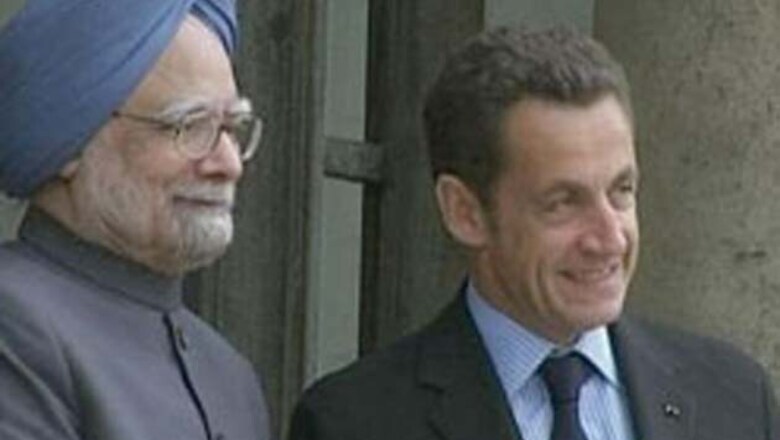
views
New Delhi: A day before the two leaders hold official talks, Prime Minister Manmohan Singh on Sunday hosted a private dinner for visiting French President Nicolas Sarkozy and his wife Carla Bruni at his residence.
He allayed his concerns over India's civil nuclear liability law, brightening the possibility of a framework civil nuclear accord being signed.
Sarkozy flew in here from Agra on Sunday evening after a four-hour stop in Bangalore on Saturday.
Manmohan Singh and Sarkozy, who have met several times in the last three years and enjoy a good rapport, held one-on-one talks for nearly half-an-hour before they joined the rest for a private dinner.
Unlike the dinner for US President Barack Obama where luminaries from civil society, academia and media were also invited, it was a more private affair for the Sarkozys with senior Indian and French ministers present at the meeting.
Senior French ministers, including Foreign Minister Michele Alliot-Marie, Defence Minister Alain Juppe and Finance Minister Christine Lagarde, were present at the dinner.
From the Indian side, Congress chief Sonia Gandhi, External Affairs Minister S.M. Krishna, Defence Minister A.K. Antony, Lok Sabha Speaker Meira Kumar, Leader of Opposition Sushma Sawaraj, National Security Adviser Shivshankar Menon and Foreign Secretary Nirupama Rao were among those present at the meeting.
Sarkozy spoke about taking civil nuclear cooperation to new heights,
but voiced concerns of French nuclear giants like Areva about some aspects of the civil nuclear liability law, informed sources said.
He also spoke about the need for India to bring its liability rules and procedures in line with international regulations like the Vienna convention, knowledgable sources added.
The two leaders also shared views on a host of global issues like reform of the international financial institutions, climate change and non-proliferation.
In particular, Sarkozy, whose country is the chair of the G20 summit of major and emerging economies, sought India's support for key goals of the French presidency of the G20 grouping.
Manmohan Singh, on his part, thanked the French leader for championing nuclear energy for India and his support, articulated in Bangalore, for New Delhi's membership of elite nuclear clubs like the Nuclear Suppliers Group, the sources said.
The prime minister also allayed France's concerns over India's passage of a civil nuclear liability law, and spoke about the country's ambitious plan for expanding nuclear energy production.
With this assurance, there is a stronger possibility of a framework civil nuclear cooperation agreement being signed between Areva and the Nuclear Power Corporation of India Limited (NPCIL) for building two European Pressurised Reactors, the sources said.
The framework accord is expected to lay down the broad rules for Areva building two nuclear reactors initially, which will eventually increase to six in number.
Areva plans to set up two atomic power plants of 1,650 MW capacity each at Jaitapur in Maharashtra.
Areva has made it clear that it is awaiting notification of implementing rules of the nuclear liability law to know the extent of the compensation they will have to pay in case of an atomic accident in facilities set up by it.
Sarkozy began his second visit to India from IT hub Bangalore where he reiterated France's support for India's candidacy for a permanent UN Security Council seat and New Delhi's bid to join top nuclear clubs, including the NSG, that govern global trade in dual-use technologies.
The two sides are also likely to sign agreements related to space, technology, education and culture after the talks.
France became the first country to sign a bilateral civil nuclear cooperation pact with India on Sept 30, 2008 after the Nuclear Suppliers Group granted New Delhi a one-time exemption from the existing rules of nuclear commerce.
The Civil Liability for Nuclear Damage Law passed by parliament recently caps the liability of the operator in case of a nuclear accident at Rs 1,500 crore (approx. $360 million), but the French suppliers, like their US counterparts, have contended that the legislation virtually makes suppliers' liability unlimited.
Last month, India signed the Convention on Supplementary Compensation for Nuclear Damage (CSC), a long-standing demand of American nuclear companies, days before Obama came to New Delhi.
The CSC, after it enters into force, would establish a uniform global legal regime for compensation to victims in the event of a nuclear accident.













Comments
0 comment